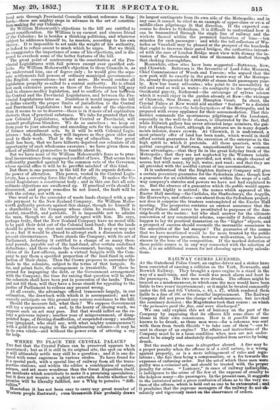WHERE TO PLACE THE CRYSTAL PALACE ?
TEE fact that the Crystal Palace can be preserved appears to be ascertained ; but as it is still in its original site, the spot on which it will ultimately settle may still be a question ; and it is one de- bated with some eagerness in various oircles. To have found for It a special park, with a special line of railway from all the trans.. Pontine stations, and within the edifice a combination of nature, science, and art more wondrous than the Great Exposition itself, are incidents which contribute to make it a promising speculation ; but it does not require a sophist to entertain doubts whether the promise will be literally fulfilled, nor a Whig to perceive "diffi- culties."
Heretofore it has not been easy to carry any great number of Western people Eastward; even Greenwich Fair probably draws its largest contingents from its own side of the Metropolis; and in any case it cannot be cited as an example of upper-class or even of middle-class pilgrimage ih that direction. If the expected con- course be drawn to Sydenham, it is difficult to understand how it can be transmitted through the single line of railway and the wickets thereof within the promised limitation of time—ten minutes for each passenger : and while the toll-collectors of Wa- terloo or Vauxhall may be pleased at the prospect of the hundreds that ought to traverse their gated bridges, the authorities intrust- ed with the care of London Bridge must -view with dismay the in- vasion of the thousands and tens of thousands drafted through that choking thoroughfare.
Meanwhile, other sites have been suggested—Battersea, Kew, and Chiswick. Battersea is the favourite of Lord John Manners, Chief Commissioner of Woods and Forests ; who argued that the new park will be exactly in the great water-way of the Metropo- lis, already frequented by 6,000,000 of steam-boat passengers year- ly. Kew has many advocates; who point to its accessibility by rail and road as well as water—its contiguity to the metropolis of Occidental gayety, Richmond—the entourage of sylvan science which it would enjoy in the garden already at Hew—the vicinage of Chiswick, Sion House, and Hampton Court. In short, the Crystal Palace at Hew would add another " feature " to a district which already invites the holydaymakers of the Metropolis and is pre. peired with every appliance for their accommodation. That this district commands mends the spontaneous pilgrimage of the Londoner, especially in. the well-to-do classes, is illustrated by the fact, that while Dulvrich gallery has never attracted large numbers, the gal- lery at Hampton Court, although its pieturea are in many depart- ments inferior, draws crowds. At Chiswick, it is understood, a most princely offer of land has been made, which would in itself afford certain guarantees for the execution of the enterprise in the high spirit to which it pretends. All these quarters, with the partial exception of Battersea, unquestionably have in common these advantages,—that they lie in the great holyday track of the Metropolis ; that they are not neglected by the Western inhabi- tants; that they are amply provided, not with a single channel of access, but with many, by rail, water, and road ; and that they are all provided with the needful extent of inn-accommodation. It is understood that the Brighton Railway Company will give a certain pecuniary guarantee for the Sydenham plan ; though how a guarantee for an exhibition can come within the scope of a rail- way company's statutes and powers we have not had explained to us. But the absence of a guarantee which the public would appre- ciate more highly is noticed : the names which appeared at the Exeter Hall meeting—the Carlisles, the Shaftesbnrys, the Argils, the Harrowbys, and others—are absent from the Sydenham project ; nor does it comprise the trustees contemplated at the Exeter Hall meeting. The prospectus contains an earnest assurance that the Crystal Palace shall never be prostituted to purposes of the dan-
cing-booth or the casino : but who shall answer for the ultimate conversion of any commercial scheme, especially if failure should happen to lay its practical damnation on the " higher " objects, and a prospect of success should reconcile the mercantile conscience to the amenities of the bal masque ? The guarantee of the names that we have mentioned would be far more trusted by the public than any prospectus promises, however well-written, or however sincere in the tone of the composition. If the marked defection of those public names is in any way connected with the selection of site, it is an additional reason for not choosing upon hasty calcula- tions.


























 Previous page
Previous page